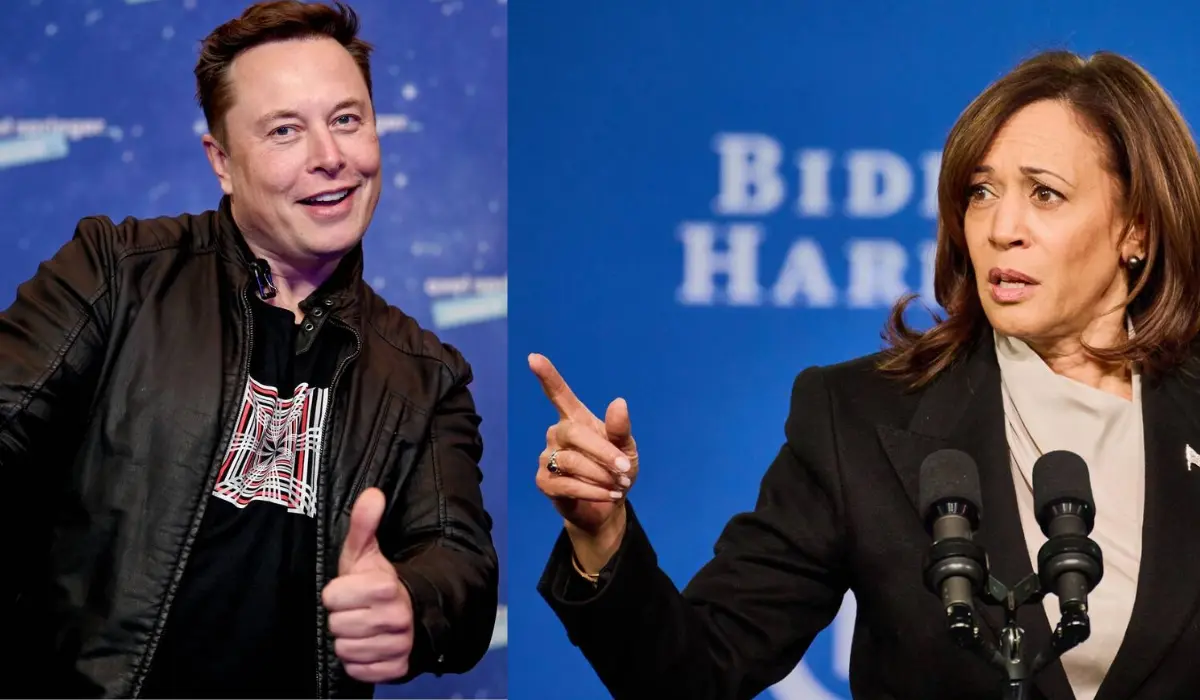Elon Musk, the billionaire CEO of Tesla and owner of the social media platform X (formerly Twitter), has once again found himself in the midst of controversy. This time, it involves a provocative AI-generated image of Vice President Kamala Harris that Musk reshared on X, sparking a heated online debate. The image, which portrays Harris dressed in communist-style attire, accompanied by a sarcastic caption, has drawn both criticism and support, highlighting the deep political divide in America.
The Image And Musk’s Sarcastic Caption
The controversy began when Musk responded to a post by Kamala Harris in which she criticized former President Donald Trump’s alleged authoritarian intentions. Harris had stated that Trump “vows to be a dictator on day one” if he wins another term. In response, Musk reshared an AI-generated image of Harris, depicted as a communist ruler, with a caption reading, “Kamala vows to be a communist dictator on day one. Can you believe she wears that outfit!?”

Musk’s caption was dripping with sarcasm, but it was the AI-generated image itself that stirred the most reaction. The depiction of Harris in communist-style clothing was seen by many as not only provocative but also as a calculated jab at the Vice President’s political stance. While it was intended to be humorous, the post quickly attracted criticism for being misleading and promoting false narratives.
Social Media Backlash: Criticism And Support
Criticism of Musk’s post was swift and widespread. Many users questioned the authenticity of the image, pointing out that it appeared to bear more resemblance to American actress Eva Longoria than Kamala Harris. One user remarked, “Setting aside everything else—which is a lot admittedly—I’d just like to say that your AI sucks. Is that Eva Longoria?”
The larger concern, however, was the potential for such posts to spread disinformation and contribute to the already polarized political climate. Some commenters accused Musk of using his platform irresponsibly, given his massive influence on X, which has millions of daily users. “It’s because of posts like this, that X is being banned and restricted in other countries,” one user pointed out, referencing recent legal challenges Musk’s platform has faced globally.
Others condemned the post as dangerous, highlighting the risks of extreme manipulation of images and the influence Musk wields. One user questioned, “Doesn’t all the money and power come with more responsibility?” implying that Musk’s actions carry weight far beyond a simple social media post.
Despite the criticism, there were many who supported Musk’s stance, particularly those who are wary of Harris’s political background. One supporter noted, “Difference is he was already president for 4 years and didn’t become a dictator. Kamala’s track record shows that she has a proclivity for corruption. Corruption leads to tyranny. We will lose America and the rest of the free world if Harris wins.” This reflected the concerns of some who fear that Harris could lead the country down a more authoritarian path if she were to assume greater political power.
Musk And Political Satire
This isn’t the first time Elon Musk has used X to provoke political debate. Since acquiring the platform, Musk has repeatedly used his account to make sarcastic or satirical comments on U.S. politics. His unfiltered commentary often generates widespread attention, with supporters praising his willingness to speak his mind, while critics accuse him of being reckless with his influence.
Musk’s post about Harris appears to fall within his pattern of political satire, but it has also sparked discussions about the ethics of using AI-generated content in such a manner. Many have pointed out the dangers of AI in spreading disinformation, with deepfakes and altered images becoming increasingly difficult to detect. The use of AI-generated content to depict politicians in misleading ways could have a significant impact on public perception, particularly when shared by influential figures like Musk.
The Role Of AI In Politics And The Media
The incident has raised broader questions about the role of AI in politics and media. As AI technology advances, there is growing concern over its potential misuse, particularly in the creation of deepfake images and videos that could manipulate public opinion. In the case of Musk’s post, the AI-generated image of Harris was clearly meant to be satirical, but critics argue that it could easily be misinterpreted as an actual depiction, especially by those less familiar with the technology.
The debate over Musk’s post highlights the challenges of regulating AI-generated content on social media platforms. As these platforms continue to play a central role in shaping political discourse, the line between satire and disinformation is becoming increasingly blurred. While humor and satire are essential components of free speech, the ability of AI to create hyper-realistic images raises new ethical considerations.
Conclusion
Elon Musk’s AI-generated image of Kamala Harris as a ‘communist dictator’ has ignited yet another controversy on X, reflecting the deep political divisions in America today. While some view the post as a harmless satirical jab, others see it as a dangerous example of how AI technology can be used to distort reality and influence political opinion.
Musk’s role as both a tech innovator and the owner of one of the world’s largest social media platforms places him at the center of debates about the ethics of online content and the responsibilities of influential figures. As AI continues to evolve, the impact of such posts on political discourse is likely to remain a topic of intense discussion.

